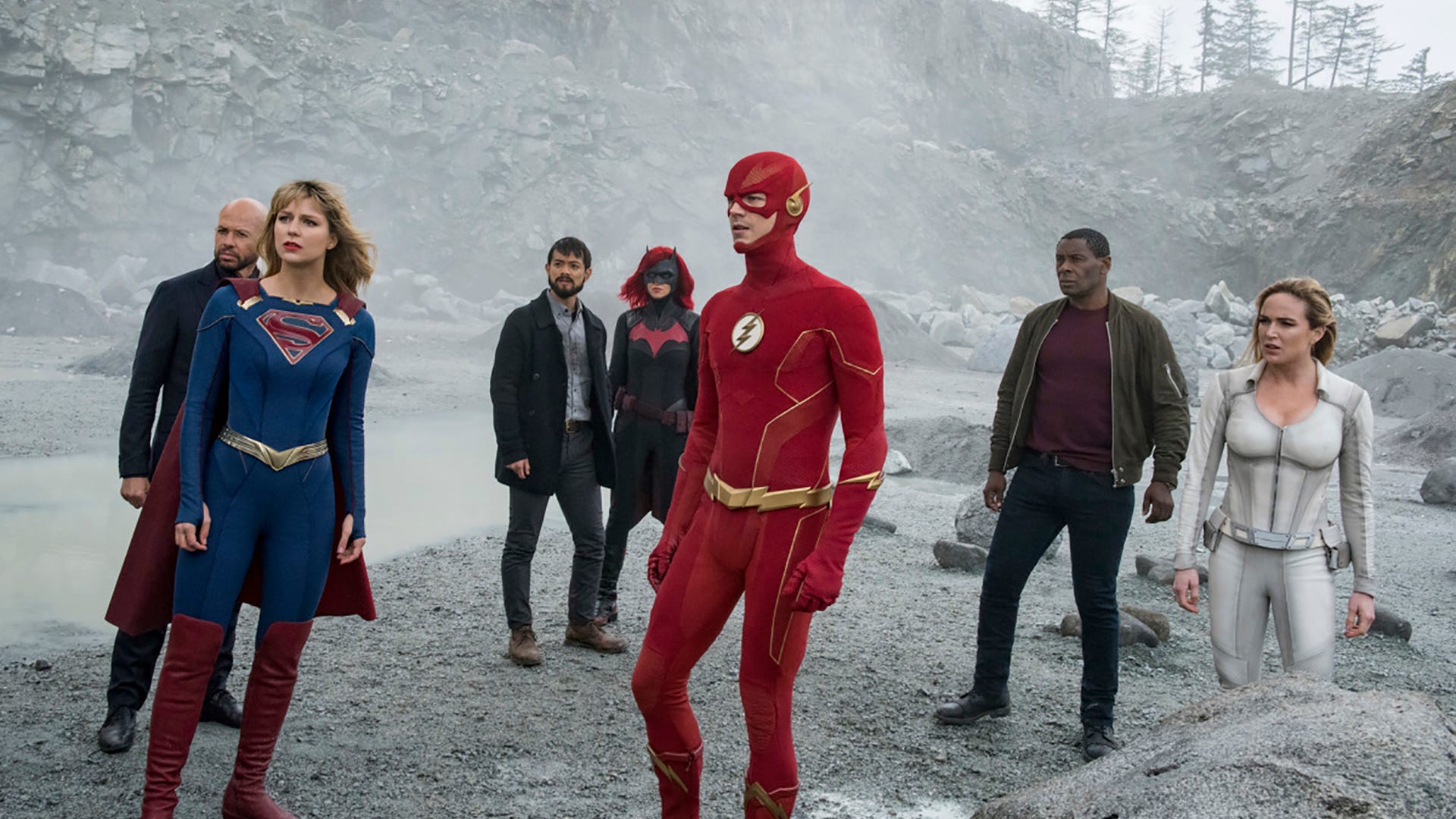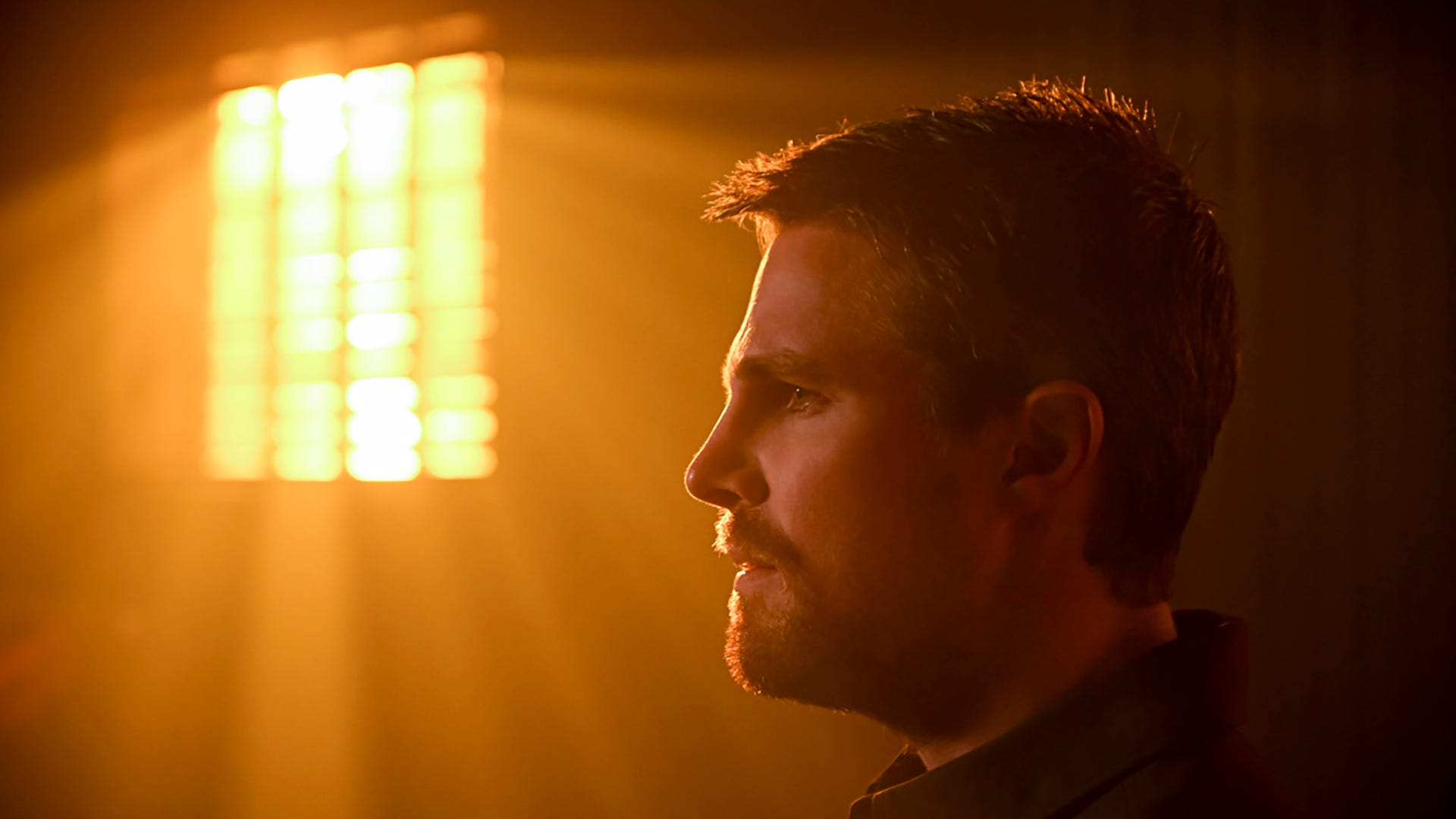Join or Sign In
Sign in to customize your TV listings
By joining TV Guide, you agree to our Terms of Use and acknowledge the data practices in our Privacy Policy.
The Legacy of Arrow: How The CW Underdog Changed an Entire Network
As it says goodbye to Oliver Queen, The CW is once again at a turning point
Although we had no way of knowing it at the time, when Arrowdebuted on The CW in the fall of 2012, it marked a turning point for the young network, which had just launched in 2006 after The WB and UPN ceased operations. Over the course of the show's eight-season tenure, which will come to an end Tuesday, the superhero series starring Stephen Amell as millionaire playboy turned arrow-slinging vigilante Oliver Queen significantly altered the trajectory and perception of The CW.
It's hard to imagine that ordering Arrow to series was ever considered a bold move for The CW, but the success of the show was never a sure thing. When the DC series launched, The CW was known more for -- and I say this lovingly -- melodramatic, female-centric programs like Gossip Girl and 90210 or the wacky antics of dramedies like Hart of Dixiethan it was for comic book fare. This was despite the fact Smallvillehad just ended a 10-season run, split between The WB and The CW, a year prior. Meanwhile, there was no guarantee that the growing success of Marvel's feature films -- The Avengershad come out just five months earlier -- would translate to the small screen, especially on the fifth broadcast network and for a character who was not terribly well known outside the realm of DC Comics.
Discover your new favorite show: Watch This Now!
Yet despite the odds, Arrow was an undeniable success for The CW. Over the course of its eight seasons, the series increased male viewership for the network; in 2017, CW President Mark Pedowitz said network viewership was 50 percent male, up from 30 percent when he started, in 2011. It also launched multiple spin-offs and anchored the Arrowverse, a shared cinematic universe that now includes The Flash, DC's Legends of Tomorrow, Batwoman, Supergirl, and Black Lightning, the last two of which were not originally part of the show's extended DC Comics world. Additionally, Arrow was also the cornerstone of an annual multi-show crossover that eventized television in a way not seen in a long time, with viewers, many of whom have not watched every CW superhero show, tuning in to see what might happen. This year, the big surprise was Ezra Miller's version of Barry Allen/The Flash from DC's cinematic universe appearing during the Crisis on Infinite Earths crossover event, thus marking the first time the films have crossed over with the TV brand in a real and major way.
However, even though the network benefited greatly from having Arrow as one of the programs leading its lineup these past eight years, the reality is that its success also resulted in a limited variety of programming being offered. The bold, creative choices that characterized the first half of the 2010s have given way to rubber stamping, both in terms of the types of shows the network develops and its renewal strategy. This leads to stability and consistency, and while knowing a show will likely end on its own terms is comforting for viewers, the result is still a network that, despite expanding original programming to six days a week in 2018 and increasing the number of original series it airs throughout the year, looks increasingly similar. This doesn't translate to bringing in potential new viewers -- or retaining those who've grown tired of the superhero genre.

Crisis on Infinite Earths
Dean Buscher/The CWWhen The CW first ordered Black Lightning, in the spring of 2017, I noted then that the network was stuck in a superhero rut. I wondered how long the network could survive by using its many superhero series -- which were already experiencing declining viewership across the board -- to prop up the rest of its deeper, more thoughtful lineup, which at the time still included Golden Globe-winning comedies Jane the Virginand Crazy Ex-Girlfriend. While Green Arrow and The Flash were saving the whole universe, Jane the Virgin and Crazy Ex-Girlfriend tackled the intersection of religion and sex, immigration, and the importance of mental health. They remain the only shows in network history to garner any kind of significant awards attention.
What executives were doing made sense: they were duplicating the series that were creatively safe but reliably brought in viewers in order to subsidize the more original, low-rated programs that brought awards and prestige. But even if the network's many superhero series remain its most-watched programs, ratings continue to decline year-over-year. For instance, The Flash, which has been the network's highest-rated program for the last several years, is currently averaging 1.3 million viewers and a 0.51 rating, but last season it averaged 1.7 million viewers and a 0.61 in the 18-to-49 demographic. The year before it brought in 2.2 million viewers on average and a 0.80 rating.
Falling ratings is a trend across television though, so what is most important to acknowledge is the shows that once brought the network acclaim are no longer part of the schedule. Jane the Virgin, Crazy Ex-Girlfriend, and even iZombie, a one-of-a-kind series that was critically praised when it premiered but struggled to maintain a certain level of quality over the years, have all concluded their runs. So what is The CW subsidizing now with its superhero properties? The network has Charmed, Legacies, and Roswell, New Mexico. There's also Dynasty, Nancy Drew, and an upcoming Riverdale spin-off, Katy Keene. But none of these are garnering praise for the network, bringing in significant viewers, or raising the bar in a unique way. They easily get lost in the superhero shuffle. The only CW series that stands out from the pack is Riverdale, which became a cultural sensation after viewers found it on Netflix. But even so, the teen-centric series is losing steam as it ages and the storylines become more and more ludicrous; the show is down 23 percent in total viewers since last season. So network executives are cannibalizing the lineup with superheroes, but to what end? Is it just to keep the Arrowverse going long after Arrow is over?
TV Premiere Date Calendar: Find Out When Your Favorite Shows Are Back
Of course, Arrow is obviously not the only series The CW has kept alive in order to capitalize on previous successes; The Vampire Diaries, which ran from 2009 to 2017, lives on in the form of the supernatural drama's second spin-off, Legacies. But while the Arrowverse superheroes have saturated The CW's schedule for years, with four or five shows airing at any one time, only The Vampire Diaries and The Originals, the drama's first spin-off, ever overlapped. Additionally, Legacies has separated itself from its predecessors through its monster-of-the-week format, and this has helped not only to breathe new life into what is a decade-old franchise, but also distinguish Legacies as a series all its own even as it relies on characters introduced elsewhere and the mythology set up by its parent series.
In contrast, only Legends of Tomorrow feels distinct among the superhero shows; the team-up series started out as more of the same but eventually leaned into its weirder and wilder tendencies, and it flourished as a result. The rest of the Arrowverse shows often follow similar narrative beats but with different characters leading the way, so it's difficult to make them feel different or nuanced even when they should arguably stand out, whether for the work they're doing for representation, such as Batwoman and Black Lightning giving voice to the LGBTQ community, or the relevant cultural issues they highlight, like Supergirl being an allegory for immigration.
This is just one small piece of a much larger issue, though, which is that original programming is almost non-existent on The CW. With the exception of midseason dramedy In the Dark, football drama All American, and the outgoing Supernatural -- one of the only series that has defined The CW more than Arrow -- every show on The CW is either an adaptation, a spin-off of an adaptation, or a reboot. While many networks and streaming services are relying more heavily on existing IP to capture the straying eyeballs of their audiences, it feels more obvious on The CW than anywhere else because it has fewer timeslots in which to program shows than most broadcast networks. It's not to say such programs cannot tell rewarding or crowd-pleasing stories -- Jane the Virgin was an adaptation of a Venezuelan series -- but many of The CW's programs are not currently operating at that level. Something needs to change.

Stephen Amell, Arrow
Sergei Bachlakov/The CWArrow helped create an identity for The CW at a time when it didn't really have one, and its initial success allowed the network the opportunity to be a risk taker. The CW took chances on clever, outside-the-box ideas and gave voices to those who had been, or were likely to be, silenced elsewhere. In addition to telenovela Jane the Virgin and musical comedy Crazy Ex-Girlfriend, the network was also praised for the way the post-apocalyptic drama The 100, which will end later this year after seven seasons, refused in its early years to hold back in its bleak depiction of human resilience and survival. The CW made a name for itself by championing shows like these, and allowing different voices to be heard. Now, it's difficult to break through the repetitive noise.
But it doesn't have to be that way. The CW, much like it was in 2012, is again at a turning point. Without its Golden Globe-winning comedies to offer it prestige, and without Arrow (and soon Supernatural) to anchor its lineup, the network is approaching a crossroads. Peak TV and the rise of streaming services over the last decade have no doubt made things increasingly more difficult for networks like The CW to succeed -- viewers are more selective than ever about what they choose to watch, as they simultaneously feel overwhelmed by the choices and burnt out by the prospect of having to keep up with everything -- but The CW has proven before that it has what it takes to proudly and triumphantly stand out. As the network bids farewell to Arrow, my hope is that it is now looking for the next Arrow, not in another costumed superhero drama, but in an exciting and fresh series that will usher in a new era and transform, once again, how we look at and perceive The CW and everything it is and can be. In other words, the network needs to listen to its own tagline and actually dare to defy.
Arrow's series finale airs Tuesday, Jan. 28 at 9/8c on The CW.
